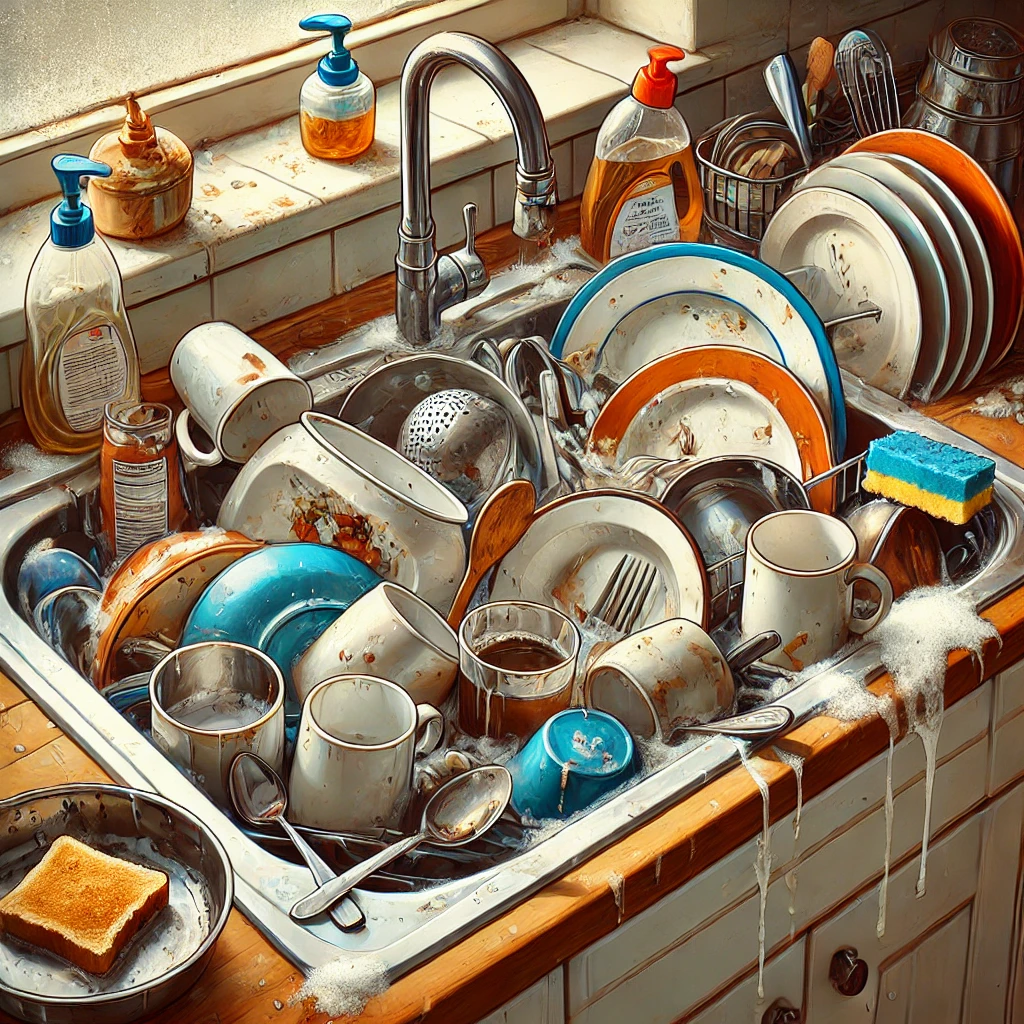Dirty
Definition
Dirty is an adjective and a verb. As an adjective, it describes something that is soiled, unclean, or covered in dirt. It can also refer to behavior that is morally impure or underhanded. As a verb, it means to make something dirty or unclean.
Parts of Speech
- Adjective
- Verb
Pronunciation
American English
- IPA Pronunciation: /ˈdɜrti/
- Respelling: DUR-tee
British English
- IPA Pronunciation: /ˈdɜːti/
- Respelling: DUR-tee
Etymology
The word "dirty" originates from the Old English "dyrtig," related to "dirt," meaning earth or filth. It evolved through Middle English to its current form, carrying meanings related to cleanliness and moral purity.
Derivatives
- Dirt (noun)
- Dirtiness (noun)
- Dirtily (adverb)
- Dirtying (verb)
- Undirty (adjective)
Synonyms
- Filthy
- Soiled
- Unclean
Antonyms
- Clean
- Pure
- Spotless
Usage
The term "dirty" is used to describe objects or environments that are unclean, as in "The clothes were dirty after the hike." It can also refer to underhanded behavior, such as "The politician used dirty tactics to win."
Related Terms
- Filth: A state of being extremely dirty.
- Grime: A layer of dirt or soot.
- Impurity: A substance or quality that makes something unclean or imperfect.
Detailed Definitions
Adjective
- Covered in or containing dirt or filth: Describes something that is physically unclean.
- Example: "The dirty dishes piled up in the sink."
- Morally impure or underhanded: Refers to behavior that is deceitful, corrupt, or unethical.
- Example: "The player used dirty tricks to win the game."
Verb
- To make something unclean: Refers to the act of soiling or contaminating something.
- Example: "The children dirtied their clothes while playing outside."
dirty



🇨🇳 Mandarin
- 污 (unclean)
- IPA: /wū/
- Respelling: wū
- 下流 (vulgar)
- IPA: /xià liú/
- Respelling: xià-liú
🇮🇳 Hindi
- गंदा (unclean)
- IPA: /ɡən.d̪aː/
- Respelling: gandā
- अश्लील (vulgar)
- IPA: /əʃ.liːl/
- Respelling: ashlīl
🇪🇸 Spanish
- Sucio (unclean)
- IPA: /ˈsu.sjo/
- Respelling: soo-syo
- Vulgar (vulgar)
- IPA: /vulˈgar/
- Respelling: vul-gar
🇫🇷 French
- Sale (unclean)
- IPA: /sal/
- Respelling: sal
- Vulgaire (vulgar)
- IPA: /vyl.ɡɛʁ/
- Respelling: vul-gair
🇸🇦 Modern Standard Arabic
- وَسِخ (unclean)
- IPA: /wa.six/
- Respelling: wasikh
- فاحش (vulgar)
- IPA: /faːħiʃ/
- Respelling: fāḥish
🇧🇩 Bengali
- ময়লা (unclean)
- IPA: /mɔjla/
- Respelling: moyla
- অশ্লীল (vulgar)
- IPA: /ɔʃlil/
- Respelling: oshlīl
🇷🇺 Russian
- Грязный (unclean)
- IPA: /ˈɡrʲæznɨj/
- Respelling: gryazniy
- Непристойный (vulgar)
- IPA: /nʲɪ.prʲɪˈstojnɨj/
- Respelling: nepri-stoy-niy
🇵🇹 Portuguese
- Sujo (unclean)
- IPA: /ˈsuʒu/
- Respelling: soo-zhoo
- Vulgar (vulgar)
- IPA: /vulˈɡaʁ/
- Respelling: vul-gar
🇮🇩 Indonesian
- Kotor (unclean)
- IPA: /kotor/
- Respelling: kotor
- Kasar (vulgar)
- IPA: /kasar/
- Respelling: kasar
🇩🇪 German
- Schmutzig (unclean)
- IPA: /ˈʃmʊtsɪç/
- Respelling: shmoot-zig
- Vulgär (vulgar)
- IPA: /vʊlˈɡɛːr/
- Respelling: vul-gair
🇯🇵 Japanese
- 汚い (unclean)
- IPA: /ki.ta.na.i/
- Respelling: kitanai
- 下品 (vulgar)
- IPA: /ɡehin/
- Respelling: gehin
🇻🇳 Vietnamese
- Bẩn (unclean)
- IPA: /ban˧˧/
- Respelling: bẩn
- Tục tĩu (vulgar)
- IPA: /tuk̚˧˥ tɨw˧˥/
- Respelling: tuc tiu
🇰🇷 Korean
- 더러운 (unclean)
- IPA: /tʌ.ɾʌ.wʌn/
- Respelling: deo-reo-wun
- 천박한 (vulgar)
- IPA: /ʧhʌn.bak̚.han/
- Respelling: cheon-bak-han
🇹🇷 Turkish
- Kirli (unclean)
- IPA: /kɪɾ.li/
- Respelling: kirli
- Kaba (vulgar)
- IPA: /ka.ba/
- Respelling: kaba
🇵🇰 Urdu
- گندا (unclean)
- IPA: /ɡən.d̪aː/
- Respelling: gandā
- فحش (vulgar)
- IPA: /fɑːħɪʃ/
- Respelling: fāḥish





